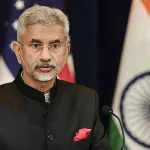In the cacophony of global politics and social media, where perception often outpaces fact, a single tweet can ignite diplomatic debates, influence investor sentiment, or become fodder for domestic political battles. Recently, former U.S. President Donald Trump stirred such a storm by posting a sensational tweet: “The Indian economy is dead.” The comment, unsubstantiated and vague in nature, was swiftly picked up and endorsed by Indian opposition leader Rahul Gandhi, who used it to mount a fresh offensive against the Modi government. Yet, beyond the noise and ideological skirmishes lies a far more complex reality—India is currently one of the fastest growing major economies in the world.
Trump’s remark, characteristically blunt and provocative, may be seen by some as an extension of his trademark populist style, where accuracy often gives way to hyperbole. However, its echo within Indian political discourse raises pertinent questions. Is this assertion rooted in economic fact, or is it a politically convenient half-truth? Why would an Indian leader endorse a foreign politician’s disparagement of national economic health, especially when macroeconomic data paints a very different picture?
India, in recent years, has indeed experienced momentary economic shocks—the demonetization of 2016, the implementation hurdles of GST, and the pandemic-induced contraction of 2020. But to declare the Indian economy “dead” is not just misleading; it borders on absurdity. In the current fiscal year, India has retained its status as the fastest-growing major economy globally, clocking a GDP growth rate of over 7%. Its resilience post-COVID, driven by strong domestic consumption, robust services sector, and infrastructural investments, has made it an economic beacon amid global uncertainty.
Inflation has been moderated, forex reserves are healthy, and FDI inflows remain robust. Global financial institutions such as the IMF and World Bank continue to revise India’s growth projections upwards. India’s stock markets have touched historic highs, and its digital economy, bolstered by platforms like UPI and Aadhaar-enabled services, is being hailed worldwide as a model for inclusive financial infrastructure. Far from being “dead,” India’s economic narrative is one of reinvention and aspiration.
Rahul Gandhi’s decision to amplify Trump’s criticism may be seen through the lens of political strategy rather than economic insight. In the rough-and-tumble of democratic opposition, every opportunity to corner the ruling dispensation is often seized—whether or not the ammunition is domestically sourced. But there’s an inherent contradiction in echoing an external critique that disregards domestic achievement. National interest must not be sacrificed at the altar of partisan gain.
It is entirely legitimate—and necessary—for opposition leaders to critique government policies, demand accountability, and highlight areas of economic distress, including unemployment, rural distress, and income inequality. However, to lend weight to an unverified and contextually ignorant statement by a foreign leader—especially one not known for nuanced global economic understanding—risks undermining India’s economic credibility on international platforms. It creates a false perception, especially for foreign investors and global stakeholders, who may conflate political rhetoric with economic reality.
India’s economy is not without challenges. Inflationary pressures, uneven rural growth, job creation, and the widening rich-poor divide remain pressing concerns. The agricultural sector, employing nearly half the population, still lags in modernization and income parity. The informal sector continues to reel under post-pandemic stress. Yet, to pronounce it dead is not just inaccurate—it is reckless.
The Indian government, under Prime Minister Narendra Modi, has consistently projected India as a rising economic power. With initiatives like “Make in India,” “Digital India,” “Gati Shakti,” and the Production Linked Incentive (PLI) schemes, efforts are underway to make India a manufacturing and innovation hub. While some of these policies have shown tangible results, others need course correction. But such nuances are flattened in the absolutism of Trumpian pronouncements.
In fact, international acknowledgment of India’s economic stature has never been more prominent. India has become the fifth-largest economy in the world, overtaking the United Kingdom. It is among the few major economies that maintained positive growth during the most uncertain global economic phases. Technology, pharmaceuticals, renewable energy, and defense manufacturing are areas where India is making rapid strides. Its demographic dividend—young, dynamic, and increasingly skilled—is another pillar for future growth.
The global context also matters. Compared to recessionary concerns in Germany, a slowdown in China, and inflation in the U.S., India’s economic trajectory is relatively stable and optimistic. Multinational corporations are increasingly looking at India as a safer alternative to China for supply chains, reinforcing the country’s geostrategic and economic relevance.
In this light, Trump’s tweet can be read more as political posturing than a serious economic diagnosis. Known for his America-first rhetoric, Trump has often viewed growing economies like India’s as competitive threats rather than collaborative opportunities. His trade tensions with India during his presidency and tariff-oriented worldview offer the backdrop to his recent comment. There is also speculation that such statements are aimed at riling up diaspora sentiment in battleground U.S. states ahead of the 2024 elections.
Rahul Gandhi, by repeating Trump’s claim, may be attempting to align international criticism with domestic discontent. However, in doing so, he risks validating a narrative that diminishes India’s global standing. For a leader who has often spoken of safeguarding India’s constitutional and civilizational ethos, this endorsement of foreign derision sits uncomfortably with the principle of constructive dissent.
The true strength of a democracy lies in its ability to accommodate critique while upholding national dignity. Indian democracy thrives on debate—but that debate must be rooted in fact, responsibility, and a shared commitment to the nation’s future.
To dismiss a thriving, complex, and forward-moving economy as “dead” is not just intellectually dishonest—it is disrespectful to the aspirations of a billion people who, despite odds, continue to build, dream, and drive the engine of one of the world’s most promising nations.
The Indian economy is not dead. It is alive, ambitious, and increasingly assertive on the world stage. The real debate must not be about a tweet but about how India can sustain inclusive growth, ensure equitable distribution of its gains, and cement its place as a global economic leader. Anything less is a disservice to both truth and the future.
(Author is RK Columnist and can be reached at:[email protected])








